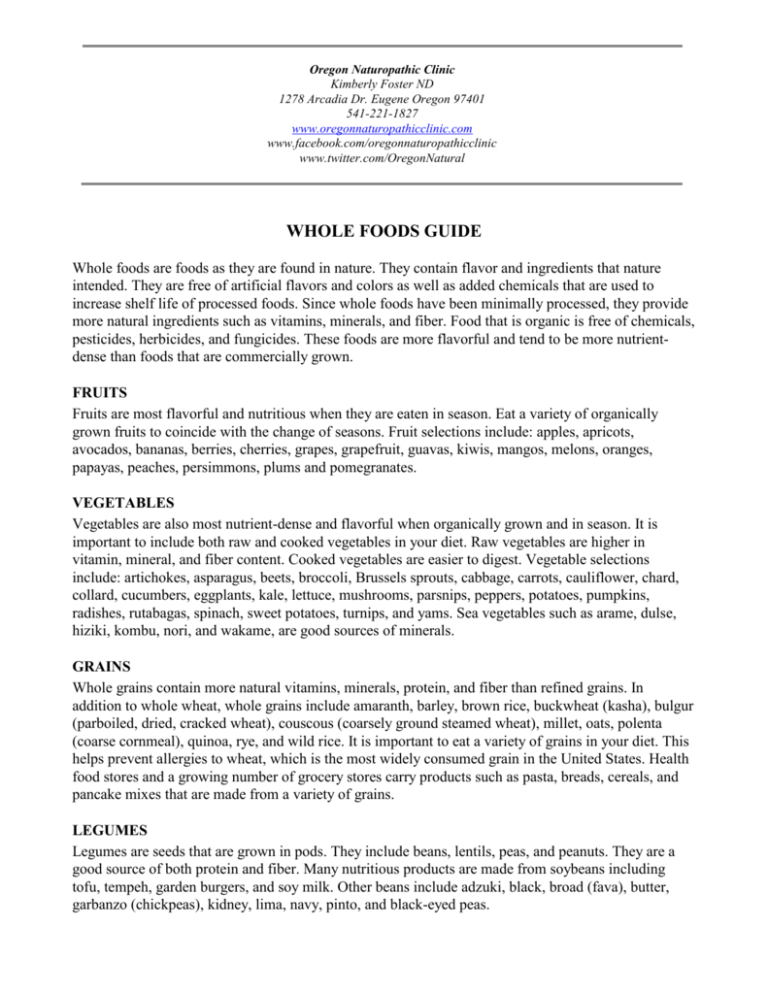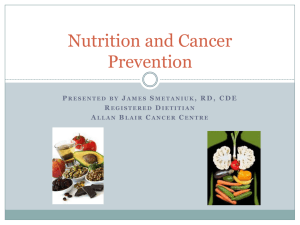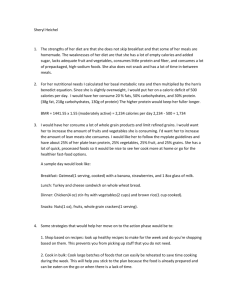Whole-Foods-Guide3 - Oregon Naturopathic Clinic
advertisement

Oregon Naturopathic Clinic Kimberly Foster ND 1278 Arcadia Dr. Eugene Oregon 97401 541-221-1827 www.oregonnaturopathicclinic.com www.facebook.com/oregonnaturopathicclinic www.twitter.com/OregonNatural WHOLE FOODS GUIDE Whole foods are foods as they are found in nature. They contain flavor and ingredients that nature intended. They are free of artificial flavors and colors as well as added chemicals that are used to increase shelf life of processed foods. Since whole foods have been minimally processed, they provide more natural ingredients such as vitamins, minerals, and fiber. Food that is organic is free of chemicals, pesticides, herbicides, and fungicides. These foods are more flavorful and tend to be more nutrientdense than foods that are commercially grown. FRUITS Fruits are most flavorful and nutritious when they are eaten in season. Eat a variety of organically grown fruits to coincide with the change of seasons. Fruit selections include: apples, apricots, avocados, bananas, berries, cherries, grapes, grapefruit, guavas, kiwis, mangos, melons, oranges, papayas, peaches, persimmons, plums and pomegranates. VEGETABLES Vegetables are also most nutrient-dense and flavorful when organically grown and in season. It is important to include both raw and cooked vegetables in your diet. Raw vegetables are higher in vitamin, mineral, and fiber content. Cooked vegetables are easier to digest. Vegetable selections include: artichokes, asparagus, beets, broccoli, Brussels sprouts, cabbage, carrots, cauliflower, chard, collard, cucumbers, eggplants, kale, lettuce, mushrooms, parsnips, peppers, potatoes, pumpkins, radishes, rutabagas, spinach, sweet potatoes, turnips, and yams. Sea vegetables such as arame, dulse, hiziki, kombu, nori, and wakame, are good sources of minerals. GRAINS Whole grains contain more natural vitamins, minerals, protein, and fiber than refined grains. In addition to whole wheat, whole grains include amaranth, barley, brown rice, buckwheat (kasha), bulgur (parboiled, dried, cracked wheat), couscous (coarsely ground steamed wheat), millet, oats, polenta (coarse cornmeal), quinoa, rye, and wild rice. It is important to eat a variety of grains in your diet. This helps prevent allergies to wheat, which is the most widely consumed grain in the United States. Health food stores and a growing number of grocery stores carry products such as pasta, breads, cereals, and pancake mixes that are made from a variety of grains. LEGUMES Legumes are seeds that are grown in pods. They include beans, lentils, peas, and peanuts. They are a good source of both protein and fiber. Many nutritious products are made from soybeans including tofu, tempeh, garden burgers, and soy milk. Other beans include adzuki, black, broad (fava), butter, garbanzo (chickpeas), kidney, lima, navy, pinto, and black-eyed peas. Oregon Naturopathic Clinic Kimberly Foster ND 1278 Arcadia Dr. Eugene Oregon 97401 541-221-1827 www.oregonnaturopathicclinic.com www.facebook.com/oregonnaturopathicclinic www.twitter.com/OregonNatural NUTS AND SEEDS Nuts are most healthy in their raw, natural form. This does not include nuts that have been salted, sugarcoated, or roasted. Roasting of nuts decreases their content of minerals and B vitamins. Choose nut butters that have not been hydrogenated. This process alters the monounsaturated oil in nuts forming cholesterol raising saturated fats. Pumpkin, sunflower, and sesame seeds are good sources of protein, minerals, and vitamin E. SWEETENERS Refined white sugar can be substituted with less refined sweeteners that contain some nutritional value. Examples include: barley malt syrup, brown rice syrup, date sugar, dried can juice, fruit juice concentrate, honey, molasses, and pure maple syrup. SEAFOOD Seafood is a good source of protein. It also contains various vitamins and minerals depending on the type of seafood. Some sea foods such as haddock, mackerel, salmon, sardines, and trout contains beneficial omega-3 fatty acids. These omega-3 fatty acids may raise protective HDL cholesterol and guard against heart disease. They also are important for proper brain, eye, hair, and skin development. Some research studies suggest that omega-3 fatty acids may also help to protect against and treat certain auto-immune disease such as rheumatoid arthritis. MEATS/POULTRY/EGGS/DAIRY Animal food sources are most healthy when the animals have been raised without antibiotics and added hormones and other toxins. In addition, choose animal products from animals that have been raised without cages. Cage-free animals experience healthier, less stressful living environments that affect the quality of food they produce. There are a growing number of dairy alternatives. They include: almond milk and cheese, rice milk, soy milk, cheese and yogurt, brazil nut cheese, nutritional yeast, and tofu sour cream. Other foods high in calcium include dark leafy vegetables such as kale, collards, and mustard greens; sea vegetables and beans. OILS Use monounsaturated oils such as olive and canola (rapeseed) oil for sautéing foods because they are more heat stable than polyunsaturated oils such as sunflower, safflower, and sesame oils can be added to foods after it has been cooked or used in salad dressings. “Cold-pressed” oils are best because the slow-turning presses that crush out the oil generate little heat so that vitamin E and antioxidants are not destroyed. Heat-pressed oils are treated with petroleum-derived solvents and are bleached and deodorized. Deodorized oil is pale and very bland tasting. Oils should be stored in the refrigerator to prevent spoilage due to Oregon Naturopathic Clinic Kimberly Foster ND 1278 Arcadia Dr. Eugene Oregon 97401 541-221-1827 www.oregonnaturopathicclinic.com www.facebook.com/oregonnaturopathicclinic www.twitter.com/OregonNatural oxidation from heat and light. Beneficial omega-3 fatty acids are found in canola, flax, soybean, and walnut oils. SEASONINGS Seasonings enhance or add flavor to food. Whole food seasonings include basil, chili peppers, cilantro, dill, garlic, lemon, lime, mint, onion, orange zest, parsley, rosemary, sage, and thyme.







